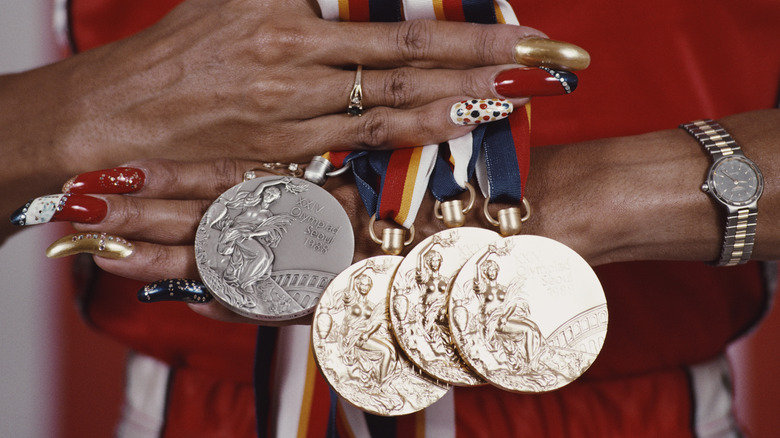The Tragic Death Of Florence Griffith Joyner Explained
It's taken track-and-field sprinters over 35 years to even begin to catch up to Flo Jo's world record-breaking speed in the 100 and 200-meter dashes. Flo Jo — full name Florence Delorez Griffith Joyner — not only won three Olympic gold medals and one silver medal in the 1988 Seoul Olympics she annihilated the competition and made a permanent mark in sports and history. Flashy, instantly recognizable, sporting colorful nails and brightly-colored leotards, and bearing a memorable and rhymeable nickname, the International Olympic Committee says it best: "There will never be another athlete quite like Flo Jo."
And yet, as such stories often go, Flo Jo died young. In 1998, a mere 10 years after her Olympic dominance, she suffered an epileptic seizure in her sleep and suffocated. As World Athletics says, she had an extremely rare condition called "cavernous angioma" borne by a mere 0.25% of the population, which causes blood to fill spaces around blood vessels in the brain and spinal column. All it took was a turned neck while sleeping, plus some blankets and pillows, to end her life.
The path to Flo Jo's early end was also tainted by accusations of performance-enhancing drug use. Per CNN, Flo Jo called such statements "jealousy," and she even passed 11 drug tests the year of her Olympic victories. Nonetheless, such accusations followed her through her 1993 appointment to the President's Council on Physical Fitness and 1995 induction into the Track and Field Hall of Fame. But in the end these ventures, too, got cut short.
Her post-Olympic career was cut short
Flo Jo didn't exactly live and vanish without making an impact on society. Modern track and fielders expected to exceed her 10.49-second 100-meter dash and 21.34-second 200-meter dash records long before the present. Sha'Carri Richardson came close, at 10.65 seconds, but Flo Jo's record still stands. As AP News quotes Flo Jo's husband Al, "The legacy she has left, that she didn't even know she was leaving, is her dreams have become many, many girls' dreams."
That's no small legacy. Even so, Flo Jo's early death curtailed the possibility of doing even more. As Biography outlines, Flo Jo got involved in a whole bunch of ventures during her post-Olympic career. As mentioned, she was appointed co-chair of the President's Council on Sports, Fitness & Nutrition (PCSFN), a federal committee devoted to advocating a healthy lifestyle for people of all ages and backgrounds. Flo Jo also founded her own non-profit organization, the Flojo Foundation, committed to propping up disadvantaged peoples — "Believe, Achieve, and Succeed!," the organization's slogan reads. Flo Jo even designed new uniforms for the Indiana Pacers, tried her hand at acting, and more.
Even though Flo Jo accomplished a lot during a short 38 years, she could have done that much more if she hadn't died so tragically early. Her work and legacy live on without her, but if she'd lived, it stands to reason that she would have continued to be an active role model for young women and been a prominent public health figure.
A sudden death marred by accusations
Flo Jo's death wasn't just sudden, it was the type of senseless death that could leave many wondering about the fragility of life. Flo Jo wasn't just physically fit, she was one of the world's most elite athletes. One bulging blood vessel, however, and she was dead.
This is precisely why Flo Jo's cause of death reignited allegations that had followed the Olympic champion for her entire career. At her physical peak in the late '80s, some claimed that Flo Jo's physique and skills came from performance-enhancing drugs. Per The Guardian, Flo Jo said it came from healthy eating, vitamins, and exercise including "5,000 sit-ups a day." Al Joyner, her husband and trainer, said on CNN, "I trained her like a man. We did a lot of things then that they do now with nutrition. The things that separated her were her mental focus and toughness." Nevertheless, Flo Jo's autopsy indicated potential complications from HGH — human growth hormone — including oversized organs that might have led to her aneurysm.
All such results were inconclusive, but still threatened to mar Flo Jo's legacy and name — a sad side effect of her tragic death. That being said, the matter of performance-enhancing drugs keeps coming when speaking of Flo Jo, even if only to generate unnecessary controversy. And while Flo Jo can't defend herself from the grave, others can. As CNN quotes Al Joyner regarding her autopsy, "My wife passed the ultimate drugs test."


